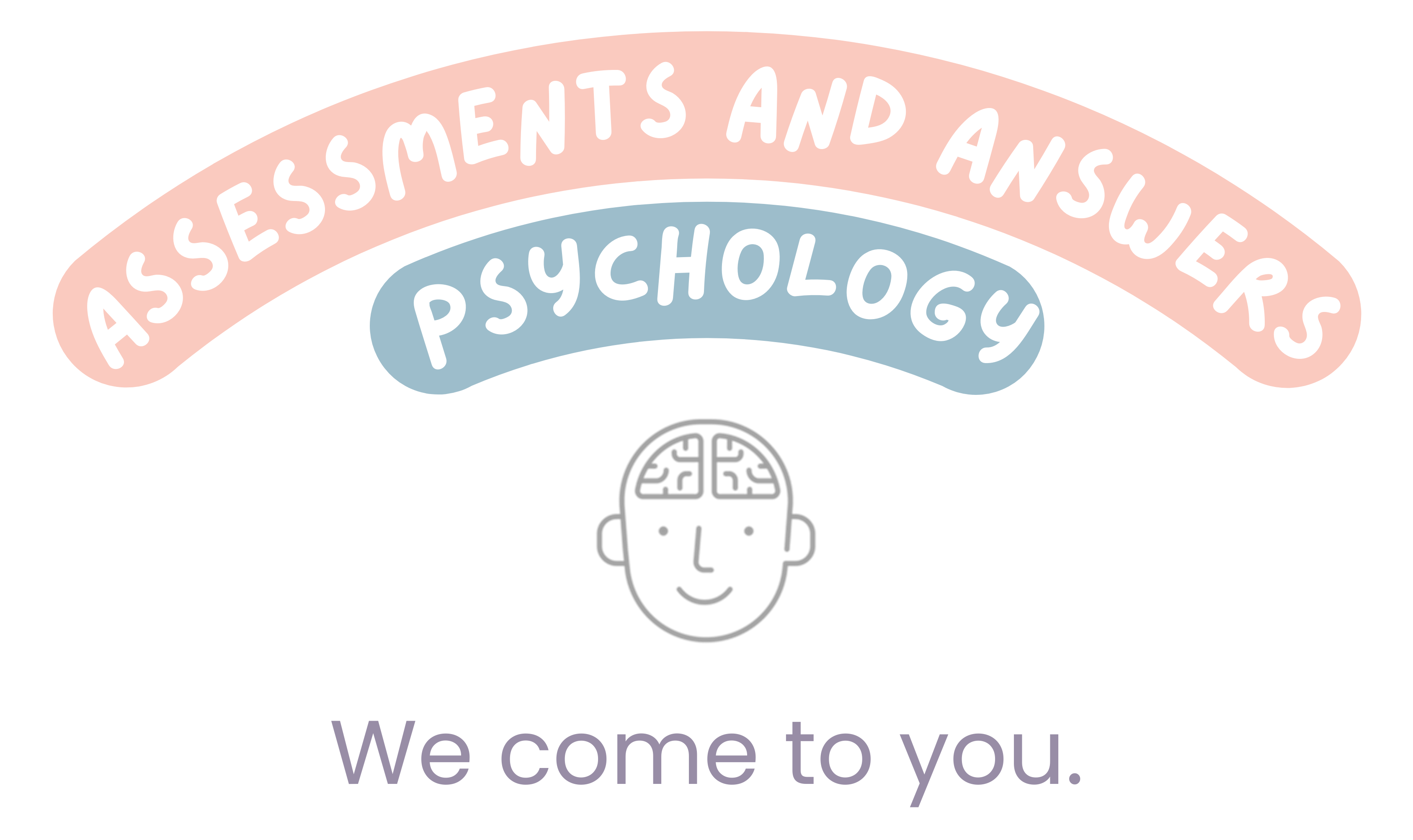Mobile Autism (ASD) Assessment for Children
Available for home, school, or community visit
Autism Spectrum Disorder (ASD) is a neurodevelopmental condition that affects communication, social interactions, and behaviour. Each individual experiences autism differently, making early and accurate assessment essential. ASD assessment helps identify a child’s unique developmental needs, enabling tailored interventions and access to appropriate resources that support their ability to thrive.
Understanding Autism Assessment

“How do I know if my child needs an autism assessment?”
ASD can present differently in every individual, so it’s natural to wonder if an assessment is the right step. Here are some common signs that may indicate an ASD assessment could be helpful:
- Developmental learning delays
- Challenges with forming and maintaining friendships
- Limited eye contact
- Heightened or reduced sensitivity to light, sound, touch, or taste
- Repetitive movements or behaviours
- Strong attachment to and fixation on specific interests
- Difficulty with impulse control
- Meltdowns triggered by small changes or transitions
“Why does my child need an autism assessment?”
Children develop and interact with the world in their own unique ways, but some differences in communication, social skills, and behaviour can significantly impact their daily lives. Autism can influence how a child learns, connects with others, and navigates challenges. Without support, these difficulties may affect their ability to grow and thrive.
An ASD assessment is a crucial step in understanding your child’s specific needs. It not only provides clarity but also may grants access to funding and tailored support services. Early identification and targeted strategies have been shown to significantly enhance communication, social interactions, and overall quality of life.
Our comprehensive ASD assessment evaluates developmental, behavioural, social, and cognitive functioning to determine if your child meets the criteria for an Autism Spectrum Disorder diagnosis. Once the assessment is complete, you will receive detailed recommendations and support tailored to the specific needs of your child and family, along with a parent/carer feedback session.
Getting Started: The Intake Process
Intake Session
- A 30-60 minute intake session is available for families uncertain about the most suitable assessment process.
- During this session, the psychologist will work with the parent/guardian to explore your child’s developmental history, relevant family background, and presenting challenges. Rating scales may also be completed to determine the most appropriate assessment and to schedule future appointments.
Inclusions and Timeline
- The Conner’s Comprehensive Behaviour Assessment (CCBA) will be provided to the child’s teacher and parent for completion through an online questionnaire.
- Once completed, the psychologist will evaluate the CCBA results to determine the most suitable assessment for the child.
- A follow-up appointment with the parent or caregiver will be conducted via phone or video call to discuss the CCBA findings, complete additional rating scales, and outline the next steps in the assessment process.
Comprehensive Autism Assessment Process
"What’s included as part of the assessment?"
No referral from a general practitioner is required for an ASD assessment. The process involves several components, including:
1. Clinical Interview and History Gathering
The psychologist will conduct a clinical interview with the parent or caregiver to collect information about the child’s family and medical history, developmental milestones, social interactions, communication skills, and behavioural patterns.
2. Rating Scales
The psychologist will request the parent or caregiver, and the child’s teacher (if applicable), to complete questionnaires that assess characteristics commonly associated with ASD.
3. Standardised Assessment
The psychologist will use a standardised assessment tool specifically designed to assist in the diagnosis of ASD.
4. Developmental and Cognitive Testing
The psychologist will assess the child’s cognitive abilities, language skills, and adaptive functioning using recognised assessment tools. This helps provide a clearer picture of the child’s current functional and social capacity.
5. Report and Recommendations
As part of the assessment, you will receive a comprehensive report along with recommendations. Please note that reports typically have a turnaround time of 4–6 weeks. The findings will be discussed with parents or caregivers during the feedback session.
6. Optional ADHD Assessment
If further assessment for ADHD is needed, we may recommend an additional one hour of testing using the Test of Everyday Attention for Children, Second Edition (TEA-Ch2). In this case, there will be an additional charge for 2 hours of clinical time, inclusive of one hour for testing and one hour for scoring and report writing.
Inclusions and Timeline
This assessment has been developed to align with diagnostic and funding body requirements. Every component is essential for providing a conclusive autism spectrum disorder diagnosis.
Session 1: Autism Diagnostic Interview–Revised (ADI-R) – up to 2 Hours
- The ADI-R is a structured interview to gather detailed valuable information about the child’s family history, developmental milestones, and presenting concerns.
- This session is available to be conducted via phone or video call.
Session 2: Autism Diagnostic and Observation Schedule, 2nd Edition (ADOS-2) – up to 1 Hour
- The ADOS-2, regarded as the “gold standard” for autism assessment, evaluates social communication skills, restricted interests, and repetitive behaviours.
- This session involves direct interaction with the child.
Session 3: Wechsler Intelligence Scale for Children, Fifth Edition (WISC-V) – up to 2 Hours
- The psychologist uses the WISC-V to assess the child’s cognitive abilities, language skills, academic functioning, adaptive functioning, and executive functioning.
- These findings contribute to a deeper understanding of the child’s functional and social capacity and inform diagnostic decisions with appropriate specifiers.
Session 4: Feedback Session – up to 1 Hour
- Scheduled 4–6 weeks after the final assessment.
- Parents or caregivers will receive a comprehensive report, including findings and recommendations, during a feedback session conducted via phone or video call.
Optional: ADHD Assessment
- If further evaluation for ADHD is needed, we may recommend an additional assessment using the Test of Everyday Attention for Children, Second Edition (TEA-Ch2).
- This includes 1 hour of testing and 1 hour of scoring/report writing. An additional 2 hours will be charged at our standard assessment rates.
Important Notes
- The autism assessment includes a comprehensive interview using the Autism Diagnostic Interview, Revised (ADI-R).
- This detailed interview explores developmental and family history, presenting challenges, and the child’s response to interventions.
- As the ADI-R interview provides the necessary background information, a separate intake appointment is not required for autism assessments.
- For assessments that do not involve the Autism Diagnostic Interview, Revised (ADI-R), an intake appointment is encouraged.
- This session provides an opportunity to gather essential background information, review family history, identify presenting concerns, and understand the child’s response to any prior interventions.
Fee Schedule and Duration
Our assessment fees are based on clinical time, charged at an hourly rate of $250.00. The total clinical time may vary depending on individual client needs, which we will discuss with families during the intake process. Additionally, a fee of $120 for assessment materials will be applied to the final invoice.
Mobile Autism (ASD) Assessment Fee Estimate: $2,620
(Based on 10 hours of clinical time and assessment materials)
Important Notes:
- Deposit: A non-refundable deposit of $500.00 is required at the time of booking.
- Final Invoice: An invoice will be issued following the completion of each assessment component.
- Payment: Full payment must be received prior to the feedback session.
- Medicare Coverage: Assessments are not covered by Medicare.
- Private Health Insurance: Some psychological services may qualify for rebates. Contact your insurer to confirm eligibility.
- NDIS Funding: Diagnostic assessments are not funded by the NDIS unless specifically requested by the National Disability Insurance Agency (NDIA). Cognitive assessments may be covered under certain circumstances; please consult your local area coordinator for details.
- Medicare Rebates for Referrals:
- When referred by a paediatrician or psychiatrist, up to four hours of diagnostic assessment may be eligible for a rebate of $93.35 per hour.
- This rebate applies only to standardised assessments and developmental/cognitive testing.
